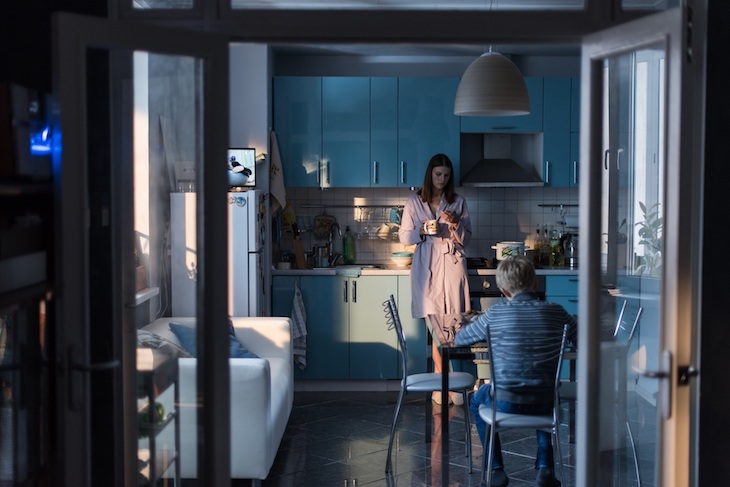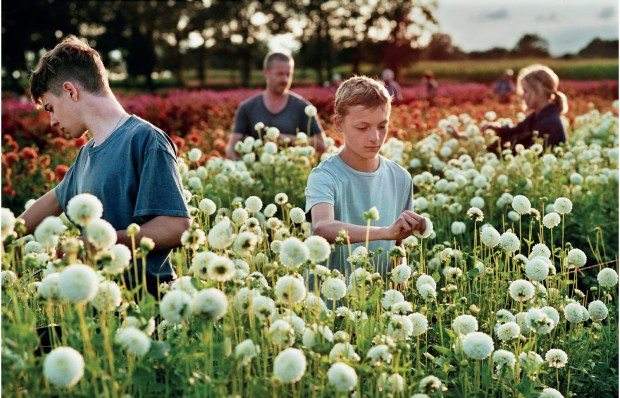Andrey Zvyagintsev’s Loveless is, indeed, devastatingly loveless, as well as devastatingly pitiless, which does not sound hopeful. Yet it is also devastatingly haunting, absorbing and transfixing. It’s a domestic drama about a missing boy that’s been widely taken as a state-of-the-nation drama about Russia today — a From Russia With No Love Whatsoever, if you like. But it may well be about the state of us all, which is the most devastating of all the devastatings. Generally, it’s just so much nicer to point the finger at others than at ourselves. (I have always found it to be much less devastating this way.)
Set in the environs of Moscow, the film opens with a shot of a school and the children pouring out at the end of the day. One child, 12-year-old Alyosha (Matvey Novikov), peels off and walks through a winter forest where the trees are all icy branches and the river is glacially still — everything in this film is profoundly cold — and the camera lingers to study the base of one particular trunk and its roots. (I can spot the symbolism; I just can’t be expected to tell you what it means.)
Alyosha makes it home, if you can call it a home. He is the son of Boris (Aleksey Rozin) and Zhenya (Maryana Spivak) who are in the midst of a bitter divorce. They row viciously about who will keep the boy, as neither likes him — she will later confess she wishes she’d had an abortion — and neither wants him. Can they palm him off on her mother? he asks. Can they, she argues, send him to boarding school until the army takes him? We then see Alyosha hiding behind the bathroom door. He has overheard, and is convulsed with sobs. Such heartless bastards, but you do want to stick with Zhenya and Boris. Or, if not that exactly, you do want to find out what Zvyagintsev plans to do with them. (Mow then down, Andrey! Mow them down!)
During the first hour we look at the parents’ lives. They are already involved with other people. Boris has a young girlfriend who is pregnant. Zhenya is dating a rich older man who has a fancy apartment and takes her to fancy restaurants and drinks from a balloon wine glass, which is always fancy. We understand that Boris is weak. He is a salesman, his boss is conservative, and he’s terrified he’ll get the sack if his divorce is revealed. Zhenya, meanwhile, is a full-on self-absorbed narcissist, preoccupied with Instagram and selfies, eyes always on her phone. Zvyagintsev is a singular filmmaker (The Return, Elena, Leviathan) but, still, he may have fallen for the old trope of judging mothers more harshly than fathers here. Slightly disappointing, this.
So Boris and Zhenya are off living their lives elsewhere, and although you’ll be thinking of the boy — who is looking after him? — they are not. It’s then discovered he’s gone missing, and has been missing for two days, so the second hour focuses on the search for him. The police are jaded, and say that they don’t have the resources to look, so a volunteer search-and-rescue organisation is contacted. They search crumbling, abandoned buildings and disused, decaying swimming pools — I can spot the metaphysical imagery; I just can’t be expected to tell you what it means — plus there’s a trip to visit Zhenya’s mother, who turns out to be delightful. No, she isn’t. Boris calls her ‘Stalin in a skirt’ and she heaps abuse on everybody. Like I said, the women are judged especially harshly here.
In having to find the boy, you expect that the couple will draw together, or will be put in touch with their humanity — but they are never let off the hook. And neither are we. The film does indict modern Russian society with references to, say, the conflict happening in Ukraine following the annexation of Crimea — Zhenya, blank-faced on a treadmill, wears a sweatshirt emblazoned with ‘Russia’ while the conflict is misreported on a TV in the background. But it could be about the spiritual vacancy at the heart of any modern society, with its self-loving use of technology, its governments that care little for its citizens and expect volunteers to clear up the mess, and all the lovelessness that can sometimes be handed down through the generations, deepening like a coastal shelf (as Philip Larkin would say).
It is a bleak film, but Zvyagintsev’s artistry means that it is not just compelling, but more involving than you’d ever think possible, given the two main characters are so unceasingly terrible. Also, it is devastating, but I think I already mentioned that.
Got something to add? Join the discussion and comment below.
Get 10 issues for just $10
Subscribe to The Spectator Australia today for the next 10 magazine issues, plus full online access, for just $10.
You might disagree with half of it, but you’ll enjoy reading all of it. Try your first month for free, then just $2 a week for the remainder of your first year.














Comments
Don't miss out
Join the conversation with other Spectator Australia readers. Subscribe to leave a comment.
SUBSCRIBEAlready a subscriber? Log in